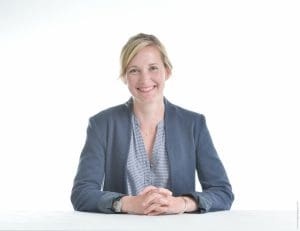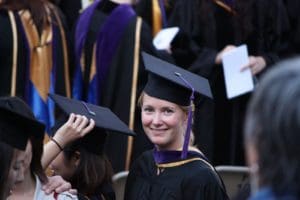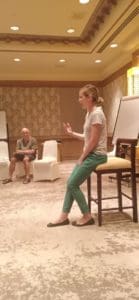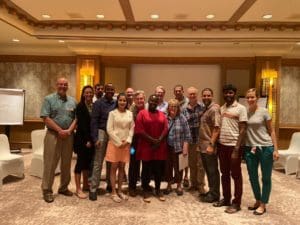From Energy Law to Mediation. Member Spotlight: Gaëlle Ezan
The issue of Climate Change is getting every year more pending and severe, affecting many communities around the globe. On the bright side, the urgency of the matter is moving an increasingly greater number of skilled minds towards getting involved in the so-called green sector, seeking to sort out effective solutions to ease the transformation of the climate and its effects on populations. Among them, Gaëlle Ezan stands out as a major expert in Energy Law in France. She qualifies herself as a pioneer in this field when as a young lawyer she decided to focus on this area of practice. At the moment, Gaëlle has abandoned the law books for dedicating full-time to support communities interested by the climate issue, by employing a different set of tools than those given by the law field.
As a mediator, her vision has broadened from solely energy and climate issues, “My focus is to help people leave peacefully together, reckoning that Climate Change is a major threat to peace. Thus, my longing is really to practice and expand mediation at every scale of conflicts: for dealing with interpersonal as well as inter-organizational matters. But among them, I have a specific interest in environmental and Climate Change-related issues because they are becoming a real challenge for all societies and they need to be handle with care; the type of care that is provided through mediation. Dedicating my efforts to the problem of Climate Change represents my personal contribution to building a more positive future” she says, “Luckily, this eventually matched with my real passion, that is mediation”. Also, read her words of reflection to the COVID-19 pandemic.
An early commitment in the law sector.
 While Gaëlle is currently rediscovering herself as a mediator, her early phase of career was dedicated to serving the law, both in courtrooms and on the books. She earned a Bachelor’s and two Masters in Law Studies. Consequently, she successfully pursued the law license as a lawyer at the Paris Bar School, starting to practice in law courts. Although it may appear that Gaëlle’s career was already launched, she was not satisfied with it. The desire to chart different waters drove her to enroll in a Master’s degree in Environmental Law not quite close to Paris, rather on the other side of the globe. Her curiosity for different contexts pushed her up towards the renowned University of Berkeley, in California.
While Gaëlle is currently rediscovering herself as a mediator, her early phase of career was dedicated to serving the law, both in courtrooms and on the books. She earned a Bachelor’s and two Masters in Law Studies. Consequently, she successfully pursued the law license as a lawyer at the Paris Bar School, starting to practice in law courts. Although it may appear that Gaëlle’s career was already launched, she was not satisfied with it. The desire to chart different waters drove her to enroll in a Master’s degree in Environmental Law not quite close to Paris, rather on the other side of the globe. Her curiosity for different contexts pushed her up towards the renowned University of Berkeley, in California.
Here, she got very keen to deepen environmental and energy studies from the point of view of the law, since in France, at that time, this sector represented a yet unfamiliar terrain. At Berkeley, Gaëlle developed her deep passion for the environmental topic, also thanks to the fact that the American higher education system was able to stimulate her personal development and out of the box thinking in a more constructive way than the rather schematic manner of teaching in France. As said, back in Europe the area of Energy Law was pretty new, and this factor contributed to mounting Gaëlle’s interest. “I liked the fact that Climate Change, despite its cruciality, represented a very new subject for the law field. I realized that this issue was fitting my interests and eagerness to contribute to bringing a positive change in the world”.
Once back in France, she centered her professional activity on Energy Law, working as an in-house legal consultant for the company Solaire Direct and as a legal associate, later partner, of Adamas Law Firm. Among her major achievements, Gaëlle features a first-line contribution to the writing and update of the Energy Code (Dalloz editions), which collects the corpus of current legislation and case-law concerning the different aspects of Energy Law.
The need for new lenses to handle conflictual processes.

As is well known, mediation resorts to quite different tools than those employed by law professionals. These tools engage creatively with listening from the heart and thinking pro-actively in shaping parties’ attitudes towards the conflict at stake and, finally, towards each other. Conversely, law practitioners can evade only slightly from a pre-set scheme of legal constraints and formal inter-personal practices with the parties of a dispute. It was exactly the need for new lenses than those used by the law that moved Gaëlle closer to mediation, despite this signified moving afar from a career she had cultivated for her whole life.
“At that time, I was attending a lot of meetings where different stakeholders were all sitting at the same table, but nobody was listening to each other, especially, I was seeing that as a legal adviser my recommendations were hardly taken in consideration and my contribution to improving the overall process only minimal”. Gaëlle recounts that sometimes, despite the various parties were agreeing about what needed to be implemented, nobody was taking actual action, even if the topic would be very impellent. She understood she needed other means to revolutionize this way of doing. “Since the beginning of my career, I had had this inner feeling that the work of the lawyer was not suitable to me. I have never been really keen to win, rather I have been more interested to find ways through which the best outcome for all the parties can be achieved”.
On her own, Gaëlle started to acquire knowledge of effective communication and neurolinguistic programming. And the more she learned, the more she wanted to know. And the more she knew, the more she got convinced to have found what she wanted to do in life. Especially, such epiphany happened after she finished reading “Non-Violent Communication: A Language of Life” by Marshall Rosenberg, a book that would have changed her life once and for all. The powerful understanding based on profound principles to handle inter-personal communication and conflict more effectively guided Gaëlle in her first steps into the mediation field. “The book from Rosenberg was decisive for both my personal and professional transformation after that, I started seeing my own cases with very different, and more powerful, lenses”. She had finally found the appropriate tools for handling conflictual processes more effectively she had been looking for so fervently.
Deploying mediation in environmental disputes.
 Having developed a firm consciousness that mediation represented her way ahead, Gaëlle is on her way to acquire an official accreditation as a mediator by the Institute Emergence, an institution specialized in non-violent communication methods. She explains that the process of finding a mediation training school was not an easy thing, as in France mediation does not receive enough attention as an alternative for disputes resolution with respect to traditional litigation. Nevertheless, despite this is slowly taking place, things are starting to change within the French legislation and Gaëlle is keen to contribute to this process through her own commitment. She also confesses of having got rid of her law title to practice fully as a mediator, because she had started to see that many people were keeping referring to her for legal advice.
Having developed a firm consciousness that mediation represented her way ahead, Gaëlle is on her way to acquire an official accreditation as a mediator by the Institute Emergence, an institution specialized in non-violent communication methods. She explains that the process of finding a mediation training school was not an easy thing, as in France mediation does not receive enough attention as an alternative for disputes resolution with respect to traditional litigation. Nevertheless, despite this is slowly taking place, things are starting to change within the French legislation and Gaëlle is keen to contribute to this process through her own commitment. She also confesses of having got rid of her law title to practice fully as a mediator, because she had started to see that many people were keeping referring to her for legal advice.
As a fully-fledged mediator, Gaëlle is currently handling concertation and mediation cases in multi-stakeholder processes, mainly related to environmental issues arising as a consequence of Climate Change. For instance, she is highly involved in the south-west part of France, where the phenomenon of coastal erosion is troubling coastal communities. Here, mediation is needed in order to engage different stakeholders in finding the best strategies for the short, medium, and long term. “It is fantastic and rewarding to dispose of a wide spectrum of tools for dealing with conflictual processes more constructively”, she acknowledges.
The key to becoming an effective mediator, according to Gaëlle, stands first and foremost in remaining humble. “As a mediator, you have to remember you are not in an upper situation, you do not know better than the parties, only broader. Thus, it is important to always keep yourself at the level and full service of the parties”. Secondly, to be successful as a mediator, one has to work on themselves first, learning how to dominate their passions and emotional triggers, in order not to undermine the whole mediation process in the wake of sudden and unexpected obstacles. “The essential point is that you have to be as much flexible as possible to keep focused on what is really important for the parties”, Gaëlle concludes.
Bali Congress
 This fundamental aspect of mediation constitutes one of the key takeaways of the Environmental Conflict Management Training that Gaëlle attended during the MBBI 2019 International Congress. “Taking part in the MBBI Congress in Bali was such an enriching experience and the Training given by Tom Fiutak was absolutely remarkable,” she says, “it was so inspiring and refreshing to get a broader overview on the efforts of mediators across the world, and so useful to learn directly from their experiences and voices”. Gaëlle felt very energized by the overall atmosphere of the Congress and she got convinced of wanting to get increasingly involved in MBBI global action. Certainly, the focus of the Organization on mediation and Climate Change really matches her aspirations and thirst for bringing a positive change in the environmental area.
This fundamental aspect of mediation constitutes one of the key takeaways of the Environmental Conflict Management Training that Gaëlle attended during the MBBI 2019 International Congress. “Taking part in the MBBI Congress in Bali was such an enriching experience and the Training given by Tom Fiutak was absolutely remarkable,” she says, “it was so inspiring and refreshing to get a broader overview on the efforts of mediators across the world, and so useful to learn directly from their experiences and voices”. Gaëlle felt very energized by the overall atmosphere of the Congress and she got convinced of wanting to get increasingly involved in MBBI global action. Certainly, the focus of the Organization on mediation and Climate Change really matches her aspirations and thirst for bringing a positive change in the environmental area.
“Oh, one last thing!”, Gaëlle says eagerly, “I would like to say a big ‘Hi’ to all the amazing people I met in Bali”.
Written by Matteo Piovacari: MBBI Writer
